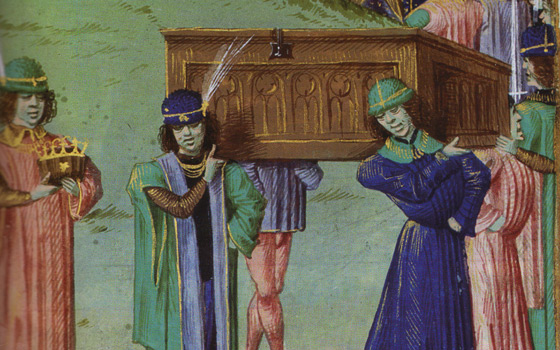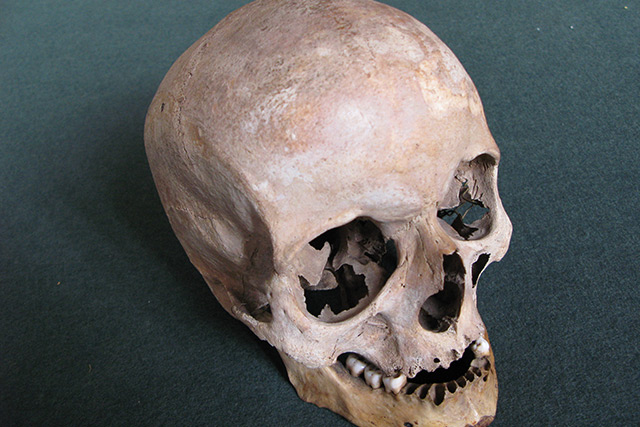IT should have been a perfect evening for Estelle, wife of the new Governor of the Colony of Victoria. There was no talk of rabbits, Mr Lalor had been charming and none of the men had made foolish jokes about the university’s decision to permit female students. The world seemed to be making progress. And then with utter spitefulness, a haughty, loud voice had exclaimed:
‘Good family! Pfaugh, nonsense. Married beneath him, didn’t he! An old man’s fancy, that’s what that gal is!’. It was spoken just behind Estelle.
Such spite from an elderly woman hard of hearing could have been aimed at several ladies at the reception, but what set this slanderous bullet straight on target was the foolishness of the woman’s daughter, who tried with the best of intentions to send her mother a silent message.
‘What?’ yelled the ninety-year-old in tones that would have reached the Dandenong Hills. ‘Why are you waving at me like that, Sybil? What, what? Speak up, gal, I can’t hear a blessed thing you are saying.’
Ladies at such times have no control over their skin and poor Estelle turned an ill red against her low cut vieux rose satin. This proclaimed to everyone within earshot that the words had wounded her and an embarrassed hush eddied out from the ladies behind her.
Now what could she do with her face burning so? Graciously pretend she hadn’t heard when everyone in the ballroom at Government House had turned their faces towards her? They were waiting for her to decide whether to rebuke the old lady or withdraw in a huff. She was still uncertain what to do when suddenly, across by the fireplace, one of the gentlemen exclaimed, ‘Good Lord, weren’t there two vases just now?’
‘WHEN that gallant young man drew the attention from you, you should have let the matter drop, Estelle,’ her new friend, Cassie, the Attorney-General’s daughter, commented as they rode together next afternoon.
‘Take it on the chin, Cassie? No, why should I? That vindictive old shrew said it deliberately.’
‘But Estelle, it’s the price we pay for being part of the beau monde. I know some people’s vulgar manners were bequeathed by convict ancestors but you should not have said so. Not in Melbourne. Your words were repeated across the bridge tables this morning, I can tell you.’
‘Never mind, Cassie. I’m learning my lesson. Edward has suggested I disappear from the city for a few weeks until the tabbies stopped miaowing. I’m to be exiled to Queenscliff.’
‘STAYING long, ma’am?’
‘I am not certain.’ Estelle stepped off the ferry from Sorrento and smoothed her black skirts against the skittish wind. The solid broad timbers felt comfortably solid beneath her leather soles and she took a deep breath of air — of freedom! Freedom from the envious eyes that watched for the unfastened button, and the carelessly dropped phrase. Except she had not dropped her phrases, she had hurled them at the old trout, and now she was here to lick her wounds. Of course, it was just a storm in a colonial teacup, but even her husband had wanted her forgotten for a few weeks while society swept up the feathers.
Carrying her one portmanteau, she walked, veiled and resolute, through the straggle of passengers waiting to board. A few fishermen untidied the jetty but only one observed her passing. His smile, the happiness of a gentleman stripped to his shirt enjoying the sun, curiously stayed with her as she crossed the bare sand that gartered the jetty. Already the salty air was working its cleansing enchantment.
‘Mrs Bramshall,’ she wrote in the hotel register, delighting in the glimpse of open fire, the profusion of flowers in the hall. It was a relief not to be recognised for the genteel jet jewellery, the merest touch of white, the black silk jacket with weeper cuffs, and the crape veil, all borrowed from Cassie (now in her second marriage) proclaimed Estelle at least a two-year widow. She sensed the clerk’s stare at her bustle and hem as she mounted the staircase; he was looking for the lack of black frilled underskirts and plain black stockings which usually hinted at some seaside assignation but Estelle’s mourning clothes left nothing to chance.
The maid showing her up to the turret room with its high brass bed and iron bedstep asked:
‘Staying long, ma’am?’
‘I’m not sure yet.’
THE fisherman from yesterday was out walking next morning as Estelle stood in solitude watching the wading birds. She had thrown the tiresome veil back but there was no time to drag it down. Below the oblique lift of straw hat, the gentleman’s smile ebbed suddenly.
There had been talk at the hotel of a hack from the city visiting the resort but although this gentleman did not look like a journalist, neither the Governor’s Lady nor the pretend widow could take the risk, so next morning, she set out earlier and was careful to observe the birds utterly.
He didn’t.
‘Would you look at the black swans grazing out there,’ his voice remarked from behind her — assertive and perilous. ‘Not a care in the world. Not even a Russian invasion fleet in sight.’
‘They are most fortunate. The swans, I mean.’ Estelle straightened, bosom high, profile straight and stony, not turning to look at him. The row of birds adorning the distant spit could have been anything in the feather line but that was not what concerned her.
‘And there’s one black swan out there that has been pecked. Do you see her cleaning her feathers not far from the pelicans?’
‘No, I am afraid I don’t,’ Estelle replied coolly. ‘You must have phenomenal eyesight, sir.’
‘I notice a lot of things other people don’t. Part of my work, Mrs Bramshall. And what a good Staffordshire name that is.’ So he was a hack.
‘Good day to you, sir.’ It was a mistake to meet the observant blue eyes. Eyes like lapis.
THE third morning she saw him coming towards her on the beach below the new fort. A skitter of joyful children trailed him like happy piglets, scurrying to show him shells, she supposed, observing him covertly now. He was younger than her, perhaps by a year or so, with dark, curling hair and a friendly, betraying mouth.
He bent and whispered to the children and suddenly they were rushing towards her, thrusting treasures out on sandy palms, while he passed her by, like a slow comet, distant but lighting her dark, cowardly soul.
In the afternoon, lured by the tinkling sound of a dulcimer, she peered over a bungalow’s back fence and through the open door. It was him playing.
He stopped, sensing her, as if he had known his music would draw her to him, and came out to stand above the back steps beneath the verandah, waiting for her to speak.
‘Why did you send them?’ she asked.
‘The children? I thought you needed shells in your life. Silver, rose, like your ballgown.’ He turned back to his dulcimer.
The musical assault on her senses resumed, its medieval lilt threading out across the grass. She was dismissed.
IN her hired bedchamber, she stared at the angled looking-glass. An old man’s fancy? Yes, there was some truth in that, she thought and wandered across to the nearest window of her turret with a sigh. Through each pane she glimpsed offers of sands and paths, but south towards the estuary where the birds fished in their mirror images, she saw the house, his house.
The following day, she stole out after she had seen him leave his gate, and went to stare like a reckless burglar across the back fence. The dulcimer was put away but upon the table stood the vase from Government House.
‘I HAVE been waiting for you,’ he told her, closing the front door later against the twilight of meddling wind and spit of rain. The tiled hall smelt of polish and lemon. She followed him into the parlour. The central gasolier had not been lit. Instead, a pillared table lamp lent the room a warm glow.
He took two fine cups from the cupboard. Gold edged cups. The spoons were silver.
‘Did you fish today, sir?’ Her calm tone gave lie to the excitement building in her soul.
‘Not today.’
While the kettle whistled between its teeth upon the hob in the kitchen, her gaze was free to make an inventory, to note the wallpaper, the choice of books. He had some nice pieces but her gaze was drawn to the vase, now on the mantle shelf.
He carried the tray through.
‘Over there,’ he said, pointing to a newspaper. ‘I read a great deal.’
‘I daresay you write, too?’ She stared with loathing at the page waiting for her upon the fringed tablecloth, the column of words that at last had been able to dedicate itself to an overripe victim. This was dangerous. He knew exactly who she was.
‘The news is later here. Let us observe the niceties, Mrs Bramshall. Let me introduce myself. I’m Jack Tomlinson.’ The name was new to her. It was the way he kissed her hand that shifted the cogs and wheels into alignment. His moustache and long side-whiskers were gone now and the spectacles he had worn at Government House had been folded away.
‘Why, you are the gentleman who was by the mantle shelf that evening,’ she exclaimed, her thoughts springing outward.
He smiled, merely gestured her to sit and pour the tea.
‘But it was you, sir, who noticed the vase was sto …’ She stared anew at the vase upon the shelf, recognising it now as almost identical. The teapot shook in her hand and it took all her concentration not to stain the cloth. Good manners demanded that she should not accuse him.
‘Yes,’ he said, as if she had spoken aloud.
‘That’s why you noticed the vases,’ she exclaimed wearing cheerfulness like a veil. ‘Because you have one yourself.’
‘How very charitable of you to assume that,’ he murmured, accepting the cup and saucer (it rattled slightly), ‘but I’m afraid that is the same vase. Do have some cake.’
‘I … I’m sure you had good reason to … to … remove the vase.’ She accepted a slice of seed cake, trying to keep her increasing panic hidden beneath a patina of politeness.
‘Yes.’ He watched her over the rim of his cup.
She took a bite of cake and then gazed at him in horror. ‘Are you going to blackmail me then?’
‘Lord, no. I only let the people round here deduce that I’m with The Age. And I’m not going to write some sordid little piece for the gossip columns, if that’s what you think.’
‘I don’t know what to think.’ Estelle rose.
Out of politeness he was forced to put his tea down and stand also. She did not storm to the hall but paced behind the sofa. ‘I don’t understand how you were fishing when I arrived by ferry. If you have been following me …’
‘That’s just it. I wasn’t following you.’ He grinned.
‘Oh, don’t tell me we are talking about destiny.’
‘Coincidence. Destiny has such a hard ring about it, don’t you think?’ He picked up the vase and slid a hand lovingly across its perfect curves. ‘I’d say ninety per cent of theft is opportunism.’
‘Then what is this about?’
‘Nothing at all,’ he said with a sigh. ‘Or something.’ The smile that serifed his mouth was sad. ‘Opportunism, if it needs a name. Or some quaint need for honesty and company.’ He reluctantly replaced the ornament and turned, his blue eyes troubled now. ‘I beg you not to bring in the local constable. It’s not just that he’s not very bright but I really am doing quite well at the moment and I had rather we became friends.’ The sophistication crept back roguishly. ‘It will make your sojourn far less tedious.’
‘But you are a self-confessed thief.’
‘Is that really important? Do you want the vase back? It will take some explaining on your part. I thought you might enjoy an adventure but if not perhaps you had better leave now.’
Estelle’s fingers tapped the back of the sofa. ‘I will stay a little longer,’ she said huskily. ‘But no more cake. I hope, Mr…’
‘Tomlinson.’
‘I hope, Mr Tomlinson, that you are a better thief than you are a cook.’
‘Oh, believe me, I am.’ He already had the Waterford crystal flute in his hand. ‘Champagne, I think. Champagne for the Governor’s Lady.’
‘BUT why did you steal the vase and then draw attention to its disappearance?’ she asked, as they strolled next day arm in arm along the loneliest path they could find.
‘To save you of course.’
She had hoped that was the answer. ‘You took that risk?’
‘It worked, didn’t it? I was rather proud of that. Besides, you deserved the favour. You had been so gracious to me on other occasions.’
‘Other occasions? I don’t remember you.’
He drew her arm tighter through his. ‘You were not meant to. I’ve collected quite a lot from Government House over the last months.’
She did not applaud him. ‘My husband was very angry about that vase. It was one of his favourite pieces.’
Her companion hit out at the bushes with his walking cane and laughed. ‘I know. I’m going to steal the other one as well. Not all at once, of course.’
‘No, please, it is far too dangerous.’ Estelle forced him to stop so they were facing one another. ‘Why must you steal?’
‘The danger, the adventure, the planning. My grandfather owned the manufactory that made that vase.’ He drew her on.
She caught her breath. ‘What at Whiston?’
‘But the factory failed when I was a boy. My papa sold what was left and I came out to the colonies to make my fortune. I regret to say I started thieving Whiston porcelain, piece by piece, and then I progressed to selecting other items too.’
‘Do you steal hearts as well?’ she teased.
‘Not usually.’ The blue gaze drowned her. ‘Would you like me to?’
‘From the governor’s lady!’
‘Believe me, I take only the best.’
AND seduce her he did. But it was subtle and slow and irresistible. For a month, she became a creature of fiction with her own forbidden hero. But adventures end in the bedside lamp being turned out, the wick lowered. Children know that day is different. That by day the musician and shepherdess ornaments return to their lonely separate ends of the shelf.
Jack Tomlinson was shot by a detective of police a year later as he made his escape from a mansion in Melbourne’s Emerald Hill, and he died that night in custody while his guards watched uncaring. The wealthy in Victoria read the news and let out a unison breath of relief.
‘STAYING long, ma’am?’
This time the mourning clothes were no disguise; the hotel was honoured by the widow of his late excellency the governor. She arrived with her maidservant and valises, but she had no interest in the hotel; at the edge of the shore the house that had stood empty was waiting, beckoning her.
For months Estelle sought her lover along the sands and where the seabirds drilled for worms. Finally, she found him in words, spinning stories from her memory, the pillow tales he had told her, the anecdotes while they had waited for the whiting to take the bait. And then the public began to buy her books, little guessing that she was the Governor’s widow and the thief had been her lover.
In her final novel, she broke the vase at Government House so it could never be stolen and she jammed the revolver before it could shoot her fictional hero dead at Emerald Hill.
IF you have the sight to see her, you can glimpse the ghost of the woman who was once the Governor’s Lady walking along the Queenscliff sands below the fort, as she once did before she died, day after day, so lonely and so long ago.
Be happy for her, for the spirit of her lover walks with her and the sands blows through them as they laugh together.
Copyright Isolde Martyn – first published in Woman’s Day, Australia.



